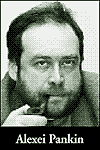 During
every major political campaign in post-Soviet Russia, with the exception
of the 1999 State Duma campaign, the state has put its entire propaganda
machine to work in the service of the president. The results have been
mixed. The enormous power of television was harnessed to ensure victory
for Boris Yeltsin and the "democrats" in 1993, 1995 and 1996,
but each time the voters seemed to cast their ballots out of spite. In
1993, they backed the clowns of LDPR. In 1995, they got behind the Communist
Party. And in 1996, when the media's efforts to secure a second term for
Yeltsin amounted to psychological warfare, Communist leader Gennady Zyuganov
received nearly 40 percent of the vote -- nearly half again the size of
the core Communist electorate. During
every major political campaign in post-Soviet Russia, with the exception
of the 1999 State Duma campaign, the state has put its entire propaganda
machine to work in the service of the president. The results have been
mixed. The enormous power of television was harnessed to ensure victory
for Boris Yeltsin and the "democrats" in 1993, 1995 and 1996,
but each time the voters seemed to cast their ballots out of spite. In
1993, they backed the clowns of LDPR. In 1995, they got behind the Communist
Party. And in 1996, when the media's efforts to secure a second term for
Yeltsin amounted to psychological warfare, Communist leader Gennady Zyuganov
received nearly 40 percent of the vote -- nearly half again the size of
the core Communist electorate.
It has been a different story with Vladimir Putin. In the 2000 presidential
election he was already regarded more as Yeltsin's opposite than his successor,
and he owed his victory to this perception far more than to the power
of television. Constant media propaganda in support of United Russia may
have played a role in the party's success this month, but it's clear that
Putin's endorsement sealed the deal.
The new election laws didn't stop television from promoting United Russia
or undermining the Communists, but at the same time they allowed the parties
to reach out to voters directly, without the mediation of journalists,
more than they had in the past. As a result, SPS suffered a dismal defeat.
Unfortunately, Yabloko also fell short of the 5 percent barrier required
for representation in the lower house. Then again, Rodina, the only party
with a substantive platform, did far better than expected.
Television coverage of the election was not objective and the government
machine once more played its part, yet because the outcome was guaranteed
by Putin's popularity, this election was marred by far fewer excesses
than in years past. So when the OSCE talks about regression of the democratic
process in Russia, I'd like to know what their yardstick is.
I would sum up the lessons of this election as follows: The people demonstrated
their confidence in Putin and their rejection of the Yeltsin legacy.
There is a fundamental paradox here that the media totally ignores for
some reason. Putin was handpicked to succeed Yeltsin. He was installed
in the Kremlin to safeguard Yeltsin's real legacy: a corrupt, oligarchic
capitalism that served the few at the expense of the many. Putin's mandate
from the voters requires him to renounce this legacy, and that can mean
only one thing: The creation of a transparent, socially oriented, investment-friendly
economy and the political institutions that go with it.
The president's actions to date could be interpreted in very different
ways: as loyal service to his predecessor, as an attempt to preserve the
system while replacing the major players, or as gathering his strength
for a battle with the Yeltsin-era system.
The fourth State Duma offers the president a wide range of political
options. The presence of Rodina, led by the strong and uncorrupted economist
Sergei Glazyev, makes it possible for the first time to implement a real
alternative to current economic policy based on judicious protectionism
and a social orientation. If Putin pursues this alternative he will have
the backing of the Communists, whose allure for big business has diminished
along with the size of the party faction in the Duma. He would also be
supported by business leaders who are interested in real production, and
by United Russia deputies from regions not blessed with natural resources.
In other words, serious support for reform could gather around Glazyev's
banner in the Duma.
Then again, Russian liberalism these days could be summed up by the
slogan "steal and let steal." By this definition, there are
probably more liberals in United Russia than in SPS. And these deputies
would prove just as dangerous to Putin the reformer as they have been
loyal foot soldiers of Putin the successor.
Who is Mr. Putin? We'll have to wait and see.
Alexei Pankin is the editor of Sreda, a magazine for media professionals.
[www.sreda-mag.ru]
See also:
the original at
www.themoscowtimes.com
State Duma elections 2003
Presidential elections 2004
|